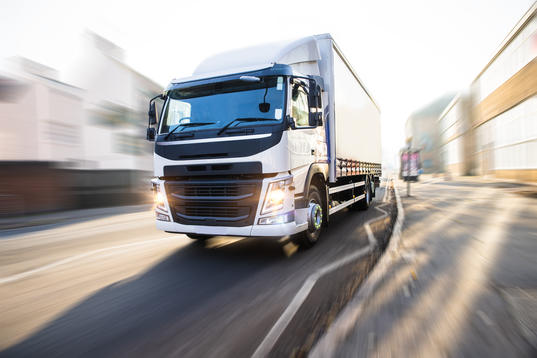Following the vote by MEPs in the ENVI Committee this morning (24th October) on CO2 targets for new freight trucks, Sandra Roling, Director of Transport at Climate Group, has commented:
“The EU’s decision today to resist the fossil fuel lobby’s call to allow loopholes for e-fuels and biofuels in CO2 standards for heavy trucks is very welcome. Alternative fuels serve only to prolong the life of the combustion engine, and we simply can’t afford that. The decision today will give businesses confidence to invest in fully zero emission trucks.
The targets to reduce CO2 emissions by 45% by 2030, and 70% by 2035 are a step in the right direction – but businesses have called for far more ambitious targets and a complete phase-out of fossil powered trucks, so this is a missed opportunity. Leading businesses are already committed to this as part of their EV100+ commitment, and greater ambition would have allowed them to transition to clean trucks more quickly.
Trucks account for just 2% of EU’s road traffic but more than a quarter of road transport emissions, causing pollution and climate impacts. Switching to zero emission vehicles as fast as possible will have a hugely positive impact on the health of EU citizens and Europe’s climate.
Prior to the vote, we issued the following release:
Global non-profit Climate Group, alongside some of the biggest transporters and shippers in Europe, IKEA, Maersk, Geopost and Unilever, have today called on MEPs to adopt ambitious carbon reduction targets for Europe’s heavy trucking sector ahead of a vote scheduled for Monday 23rd October.
The businesses are concerned about any mechanism designed to create loopholes in favour of biofuels and e-fuels in the Regulation which would lower the CO2 emission targets and delay the production and availability of truly zero tailpipe emission trucks.
Ahead of the vote in the ENVI committee of the European Parliament on the Regulation CO2 emission standards for new heavy-duty vehicles, Climate Group has argued that the vote is crucial for companies’ investment strategies.
Ambitious CO2 emission reduction targets would increase the availability of zero emission trucks and allow companies to fully decarbonise their fleet by 2040. IKEA, Maersk, Geopost and Unilever have all committed to running zero emission trucks in Europe by this date as part of their commitment to Climate Group’s EV100+ initiative.
EU policy should favour truly zero emission tailpipe trucks, according to Climate Group, like battery electric trucks and fuel cell electric trucks.
With trucks accounting for just 2% of EU’s road traffic but more than a quarter of road transport emissions, switching to fully zero emission vehicles as fast as possible will have a hugely positive impact on the health of EU citizens and Europe’s climate.
Sandra Roling, Director of Transport at Climate Group:
“Switching to zero emission heavy trucks is essential if the EU is to meet its commitment to carbon neutrality by 2050. With global CO2 emissions from trucks accounting for more pollution than both the aviation and shipping sectors combined, this needs to happen as quickly as possible.
“The EU needs to support businesses who clearly want electric trucks by passing ambitious CO2 emission reduction targets. Any loopholes or back doors for the inclusion of e-fuels or biofuels serve only to delay the switch, making it harder for businesses to source truly zero emission trucks as manufacturers will continue to offer polluting models.
“It’s also an opportunity to secure Europe’s long-term competitiveness. Markets like China and the US, where manufacturers are moving ahead with zero emission models, are demanding change and innovation.”
Elisabeth Munck af Rosenschöld, Global Sustainability Manager, IKEA Supply Chain Operations, adds:
“IKEA fully supports the call for stronger CO2 reduction targets for heavy-duty vehicles. We are on a journey to decarbonise the way we move IKEA goods from our suppliers to the customers. It’s urgent to reach a positive tipping point where zero emission trucking becomes the new norm.”
Jean-Claude Sonet, EVP of Geopost, in charge of Marketing, Communications & Sustainability, adds:
“A pioneer in last-mile delivery, we at Geopost have set a clear target for net zero emissions by 2040. This ambition demands pivotal measures such as the transition of our fleet. We, however, cannot achieve this alone. The European Parliament has a unique opportunity in store to drive change by supporting the production of zero tailpipe emission heavy-duty vehicles in Europe, thus leading a resolute carbon trajectory. This key lever will help us reach our goals and break away from fossil fuel transport.”
Kenny Kristensen, Global Head of Energy Transition Execution Transported by Maersk – Landside, adds:
“It is crucial that the EU adopt ambitious targets for road transportation for the industry to decarbonize by 2040 and for the EU to stay competitive against growing competition internationally. The idea to introduce incentives for green fuel in road transport is concerning. As a company operating all modes of transportation, we know how important it is to prioritize Bio and E-Fuels for aviation and ocean-going shipping, which cannot be electrified.
“Road transport decarbonization has to be driven by electrification, whether it’s by battery or fuel cell. This is indeed achievable, and we are progressing from Maersk’s side for instance with direct investments into Heavy Duty BEV Trucks in Germany (25) and USA (400+) as well as deployments with our trucking partners in both Sweden, Norway and UK.
